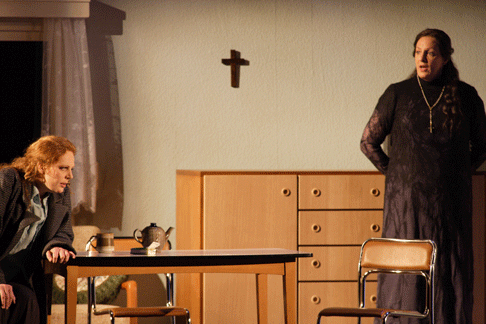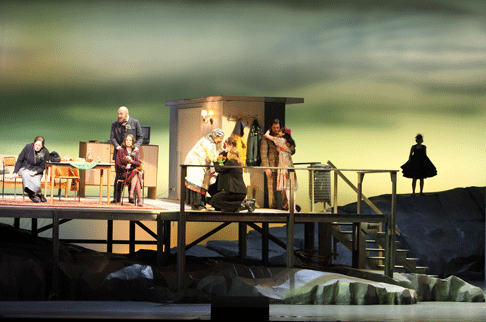![Eva-Maria Westbroek and Joseph Kaiser [Photo by W. Hoesl courtesy of the Bavarian State Opera]](http://www.operatoday.com/Jenufa_Munich02.gif)
22 Apr 2009
Jenůfa at the Bavarian State Opera
The Bavarian State Opera’s new production of Leos Janacek’s Jenufa is a feather in the cap of intendant Nikolaus Bachler.
English Touring Opera are delighted to announce a season of lyric monodramas to tour nationally from October to December. The season features music for solo singer and piano by Argento, Britten, Tippett and Shostakovich with a bold and inventive approach to making opera during social distancing.
This tenth of ten Live from London concerts was in fact a recorded live performance from California. It was no less enjoyable for that, and it was also uplifting to learn that this wasn’t in fact the ‘last’ LfL event that we will be able to enjoy, courtesy of VOCES8 and their fellow vocal ensembles (more below …).
Ever since Wigmore Hall announced their superb series of autumn concerts, all streamed live and available free of charge, I’d been looking forward to this song recital by Ian Bostridge and Imogen Cooper.
The Sixteen continues its exploration of Henry Purcell’s Welcome Songs for Charles II. As with Robert King’s pioneering Purcell series begun over thirty years ago for Hyperion, Harry Christophers is recording two Welcome Songs per disc.
Although Stile Antico’s programme article for their Live from London recital introduced their selection from the many treasures of the English Renaissance in the context of the theological debates and upheavals of the Tudor and Elizabethan years, their performance was more evocative of private chamber music than of public liturgy.
In February this year, Albanian soprano Ermonela Jaho made a highly lauded debut recital at Wigmore Hall - a concert which both celebrated Opera Rara’s 50th anniversary and honoured the career of the Italian soprano Rosina Storchio (1872-1945), the star of verismo who created the title roles in Leoncavallo’s La bohème and Zazà, Mascagni’s Lodoletta and Puccini’s Madama Butterfly.
Evidently, face masks don’t stifle appreciative “Bravo!”s. And, reducing audience numbers doesn’t lower the volume of such acclamations. For, the audience at Wigmore Hall gave soprano Elizabeth Llewellyn and pianist Simon Lepper a greatly deserved warm reception and hearty response following this lunchtime recital of late-Romantic song.
Collapsology. Or, perhaps we should use the French word ‘Collapsologie’ because this is a transdisciplinary idea pretty much advocated by a series of French theorists - and apparently, mostly French theorists. It in essence focuses on the imminent collapse of modern society and all its layers - a series of escalating crises on a global scale: environmental, economic, geopolitical, governmental; the list is extensive.
For this week’s Live from London vocal recital we moved from the home of VOCES8, St Anne and St Agnes in the City of London, to Kings Place, where The Sixteen - who have been associate artists at the venue for some time - presented a programme of music and words bound together by the theme of ‘reflection’.
'Such is your divine Disposation that both you excellently understand, and royally entertaine the Exercise of Musicke.’
Amongst an avalanche of new Mahler recordings appearing at the moment (Das Lied von der Erde seems to be the most favoured, with three) this 1991 Mahler Second from the 2nd Kassel MahlerFest is one of the more interesting releases.
‘And there was war in heaven: Michael and his angels fought against the dragon; and the dragon fought and his angels, And prevailed not; neither was their place found any more in heaven … that old serpent … Satan, which deceiveth the whole world: he was cast out into the earth, and his angels were cast out with him.’
If there is one myth, it seems believed by some people today, that probably needs shattering it is that post-war recordings or performances of Wagner operas were always of exceptional quality. This 1949 Hamburg Tristan und Isolde is one of those recordings - though quite who is to blame for its many problems takes quite some unearthing.
There was never any doubt that the fifth of the twelve Met Stars Live in Concert broadcasts was going to be a palpably intense and vivid event, as well as a musically stunning and theatrically enervating experience.
‘Love’ was the theme for this Live from London performance by Apollo5. Given the complexity and diversity of that human emotion, and Apollo5’s reputation for versatility and diverse repertoire, ranging from Renaissance choral music to jazz, from contemporary classical works to popular song, it was no surprise that their programme spanned 500 years and several musical styles.
The Academy of St Martin in the Fields have titled their autumn series of eight concerts - which are taking place at 5pm and 7.30pm on two Saturdays each month at their home venue in Trafalgar Square, and being filmed for streaming the following Thursday - ‘re:connect’.
The London Symphony Orchestra opened their Autumn 2020 season with a homage to Oliver Knussen, who died at the age of 66 in July 2018. The programme traced a national musical lineage through the twentieth century, from Britten to Knussen, on to Mark-Anthony Turnage, and entwining the LSO and Rattle too.
With the Live from London digital vocal festival entering the second half of the series, the festival’s host, VOCES8, returned to their home at St Annes and St Agnes in the City of London to present a sequence of ‘Choral Dances’ - vocal music inspired by dance, embracing diverse genres from the Renaissance madrigal to swing jazz.
Just a few unison string wriggles from the opening of Mozart’s overture to Le nozze di Figaro are enough to make any opera-lover perch on the edge of their seat, in excited anticipation of the drama in music to come, so there could be no other curtain-raiser for this Gala Concert at the Royal Opera House, the latest instalment from ‘their House’ to ‘our houses’.
"Before the ending of the day, creator of all things, we pray that, with your accustomed mercy, you may watch over us."
![Eva-Maria Westbroek and Joseph Kaiser [Photo by W. Hoesl courtesy of the Bavarian State Opera]](http://www.operatoday.com/Jenufa_Munich02.gif)
The Bavarian State Opera’s new production of Leos Janacek’s Jenufa is a feather in the cap of intendant Nikolaus Bachler.
It opened April 8 at Munich’s Nationaltheater as part of his second season as director. His program presents a mix of both traditional productions and concept-driven, edgy regietheater repertory. But “traditional” does not mean “old-school.”
Formerly director of Vienna’s famed Bergtheater, Bachler was aware of stage director Barbara Frey’s work and his invitation for her to stage Jenufa, her first opera, was a gamble that paid off. She took the story of lost love and infanticide to heart and her taut reading makes the story both searing drama and epic tragedy.
Based on a story, Jeji Pastorkyuna (Her Stepdaughter), by Gabriellla Preissova, it is a relatively early opera by Janacek but marks him emphatically as a master of musical drama and is now performed regularly on the world’s major opera stages. It is the story of a young girl, who gives her name to the opera, and her love affair with the town dandy, Steva. Pregnant with his child, she bears the child in secret while he sows his oats and avoids entanglements. Her high-strung, widowed step-mother, Kostenicka, increasingly unhinged, drowns the baby, which is later discovered by the townspeople. Jenufa is immediately accused but Kostenicka confesses and Jenufa goes through with her marriage to the hapless but devoted Laca.
The setting, an open house on stakes, was designed by Bettina Meyer, and served to concentrate the tension of this dangerously dysfunctional family drama. The crowds who appear outside with the discovery of the body of the love child in the lake, scramble over the forbidding rocks in this desolate landscape. Staging, costumes and lighting all contribute to the sense of desolation which permeates this drama. Slightly updated - wind turbine towers are in the background and a cheap TV is on the table - the small town claustrophobia is easily understood by contemporary audiences.
Bachler was generous with the assembled voices to bring this off. The blazing work of soprano Eva-Maria Westbroek has generated much press recently and, in the title role, her desperate love for a feckless young man, Steva, could not be more heart-wrenching. Gifted with one of the most passionate and powerful voices of today, her anguish was palpable.
There was a sure chemistry between her and her step-sister, Kostenicka, played to perfection by the veteran soprano Deborah Polaski. Watching these two professionals relate was the high-point of the evening. Canadian Joseph Kaiser, with a clear, expressive tenor, was convincing as young Steva. Tenor Stefan Margita, has made his disturbing, complex reading of Laca a simply indispensable part of this opera. It was a quartet of talent that created an intensity rarely experienced on the opera stage. The secondary characters, all excellent, including opera legend Helga Dernesch, now 70, as the grandmother. Sometimes wayward of tone, her character was theatrically on target.
 Eva-Maria Westbroek and Deborah Polaski
Eva-Maria Westbroek and Deborah Polaski
It was a fine night also for Kirill Petrenko who lead the opera orchestra and chorus with a vivid sense of musical expression. His career is taking off in the last few years with major appearances in the pit at New York, Paris, Vienna and London and his galvanizing leadership contributed to the seamless night of high-voltage music making.
The opera is playing now at the Bavarian State Opera’s National Theater through April 27 and will be seen again as part of the Munich Opera Festival on July 9. Information, with pages in English, is at http://www.bayerische.staatsoper.de/.
Frank Cadenhead
 Scene from Jenůfa
Scene from Jenůfa